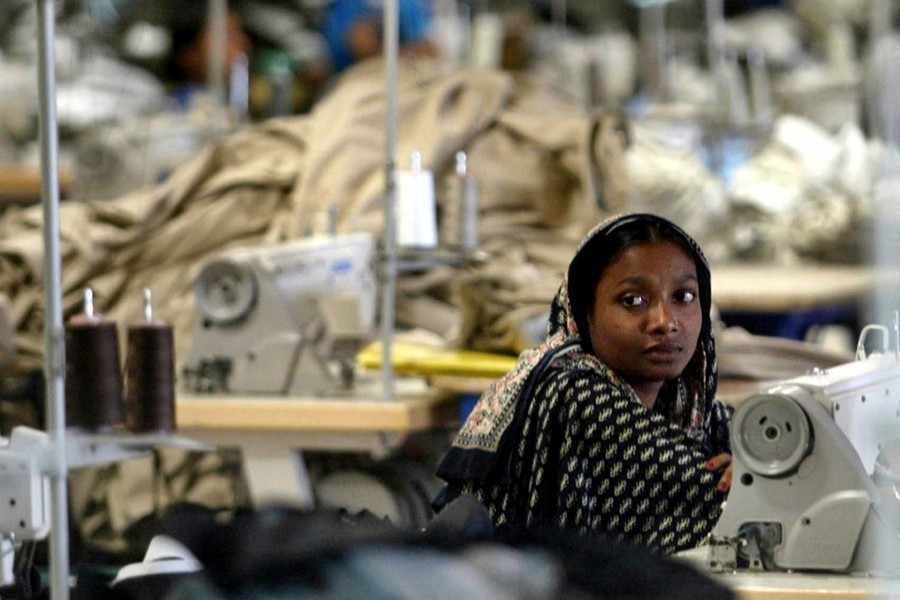The cost on account of salary and wages of management employees and general workers in Bangladesh is one of the lowest in Asia and the Pacific, said a recent survey carried out by the Japan International Trade Organisation (JETRO).
There exists a wide gap in wages of workers and salaries of experienced management personnel and engineers employed in various productive sectors in Bangladesh and other countries of the region. Only Myanmar is close to Bangladesh in terms of workers' salaries and wages.
Low wage is considered a positive element as far as attracting foreign investment is concerned despite the fact that this works as a disincentive for workers.
There is no denying that workers' low wage has remained the principal attraction for most foreign establishments that have invested in Bangladesh, particularly in the manufacturing sector.
The main reason for low wage is abundant supply of workers, mostly unskilled ones, vis-à-vis a low level of industrialisation.
But, unfortunately, that low wage alone has not been able to draw enough of foreign investment. The volume of foreign direct investment has been highly inadequate compared to many other countries in the region. Many late entrants in the global market are attracting far greater volume of FDI now. Greater inflow of FDI has also helped those countries boost their annual export earnings notably.
That Bangladesh is deficient in many areas where foreign investors are interested to look into is a widely known fact. Bangladesh remains at the lower rung of the 'Ease of Doing Business' Index of the World Bank. It is placed at 176th position among 189 countries. Even war-torn Afghanistan is ahead of Bangladesh in the ranking. In the WB's Logistics Performance Index, Bangladesh is ranked 100th among 160 countries.
The reasons for Bangladesh remaining less attractive as a foreign investment destination are known to all, including the policymakers. Scarcity of land, poor infrastructures, power and gas shortage, bureaucratic red-tape, port problems are among the long list of hurdles that both local and foreign investors face. Lately, there have some efforts on the part of the government to improve the situation.
Coming again to the issue of low labour cost, it can be noted that there is abundant supply of workers in the Bangladesh's labour market and employers are in a position to dictate terms, as far as wage fixation is concerned.
The latest JETRO survey has made a comparison of cost of production in Japan with that of some other countries. Bangladesh is well ahead in this area. The cost of production of a good in Bangladesh is half of that in Japan. The same is much higher in Sri Lanka, Cambodia, Vietnam, Myanmar, India and Pakistan.
Despite substantial cost advantage, investors are found not to be particularly enthusiastic to come to Bangladesh. The JETRO survey listed a number of hurdles that the foreign investors have been facing here. Poor quality control mechanism for products, low labour quality, delays in the release of imports at ports and uptrend in labour wages are among the hurdles mentioned in the survey.
The Japanese companies operating in Bangladesh have expressed the desire to expand their business further. But many potential investors from other countries are not that risk-averse. The labour cost-related advantage is failing to allure them to the country.
Besides, there are a few problems with Bangladeshi workers and employees. Their productivity and skill level are low compared to that of workers in other countries in Asia and the Pacific.
This negative side of the Bangladesh workforce is evident from engagement of a good number of foreign skilled and management officials in local industries at a substantial cost. These people, naturally, remit funds back home. But this outward remittance is creating an uncomfortable feeling among the population since remittance earning represents one of the pillars of the country's economy.
Thus, it has become imperative for the country to improve the skill level of its workers and management personnel, for it cannot afford draining of hard-earned foreign currency on account of alien workers.
The policymakers, these days, are talking loud about initiating projects and programmes to produce skilled workers for both domestic and external job markets. It, however, remains unclear whether the skill-development programmes, formulated by the bureaucracy, are need-based or not.
Trade bodies should be more vocal and create pressure on the government to help produce skilled manpower that is in high demand in both local and external job markets. Industries themselves need to make genuine efforts to create manpower suiting their respective need.
Skill development might help workers to ask for higher wages. But even after hike in wages, the cost of labour in case of Bangladesh is likely to be lower than any other country.
In addition to meeting the skill development issue, the government should remove other obstacles to greater inflow of foreign investment. However, foreign investors are keen watchers of the behaviour of their domestic counterparts here. A sort of stagnancy has been prevailing in investment in recent years. The situation needs to be reversed through appropriate policy measures.


